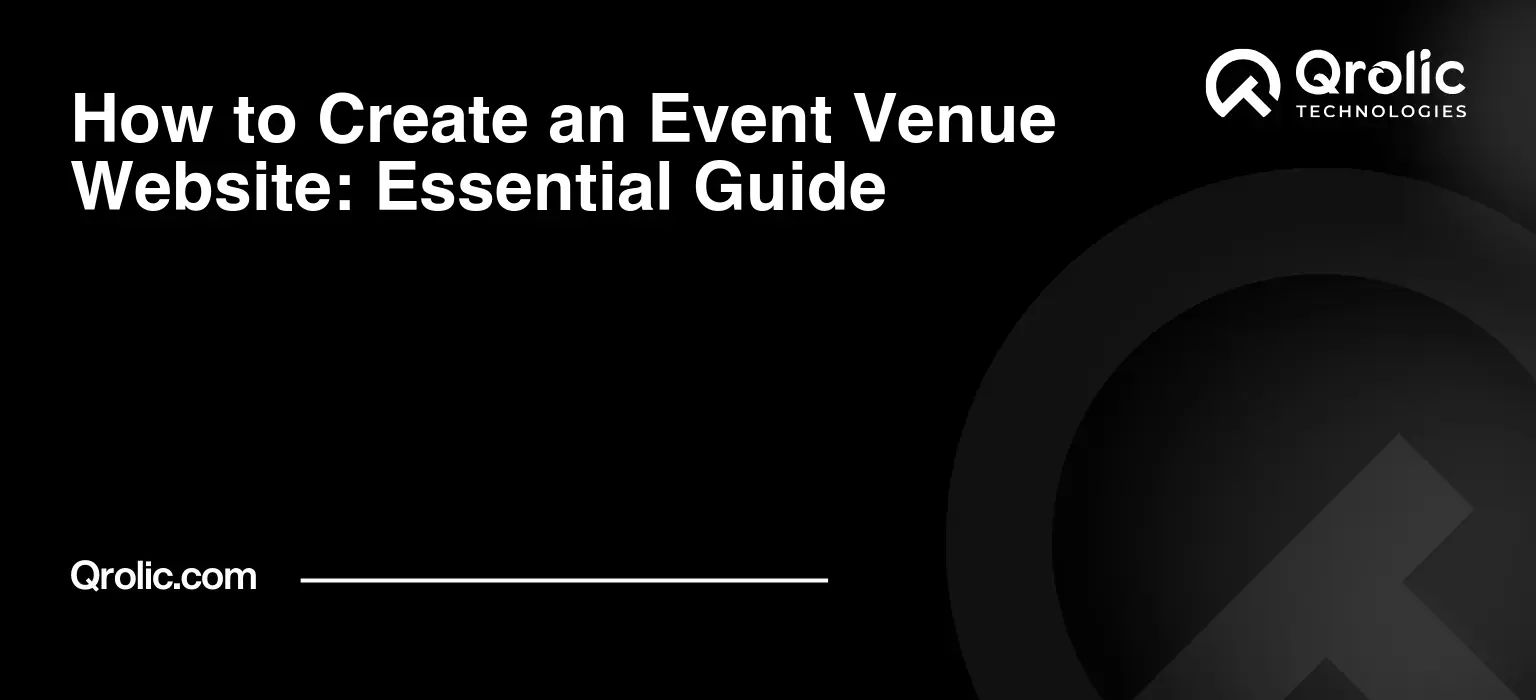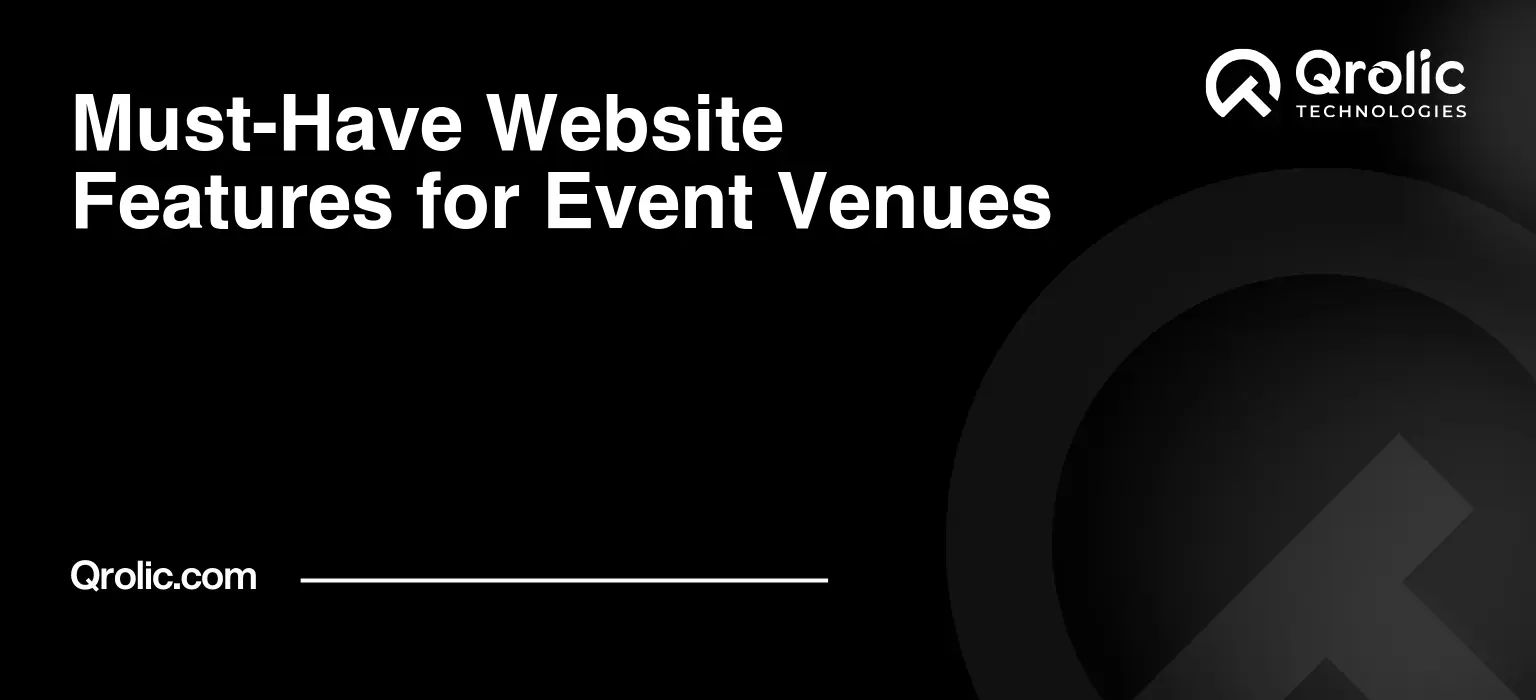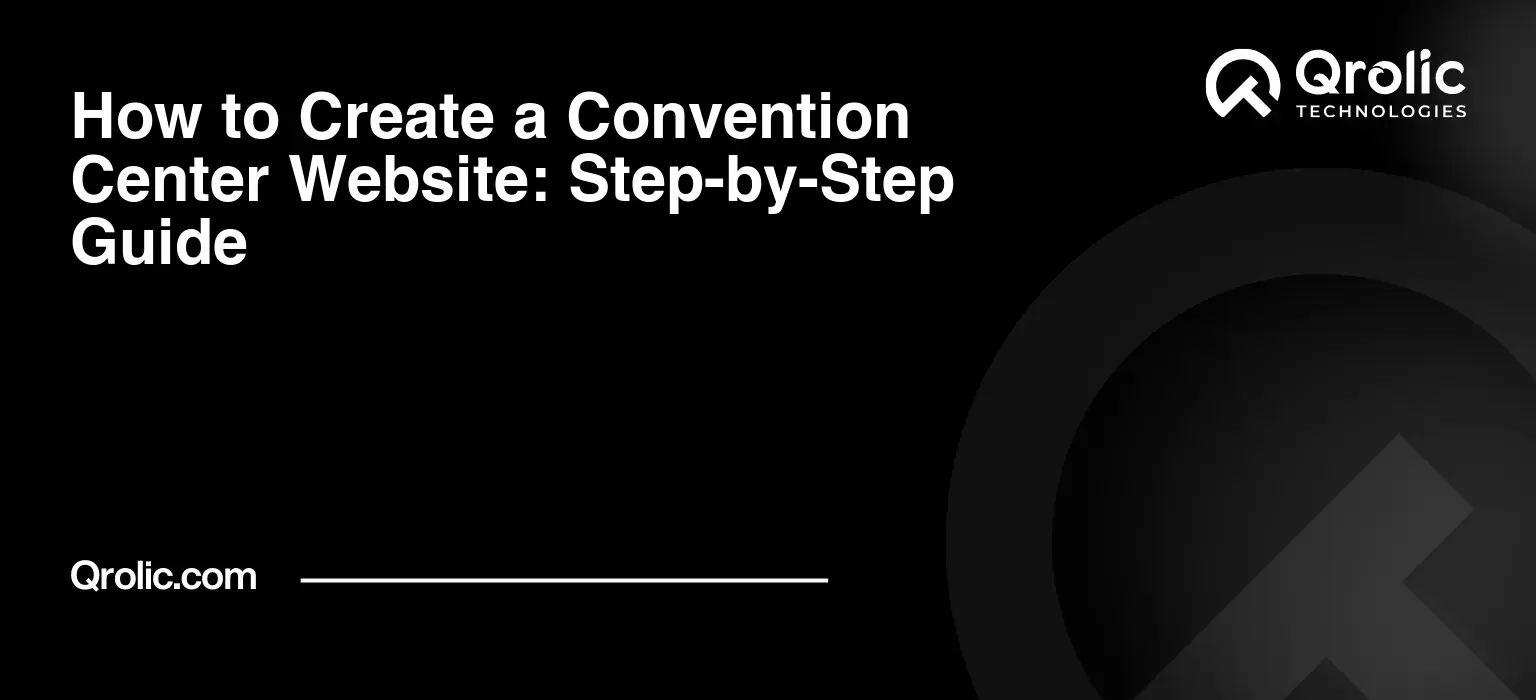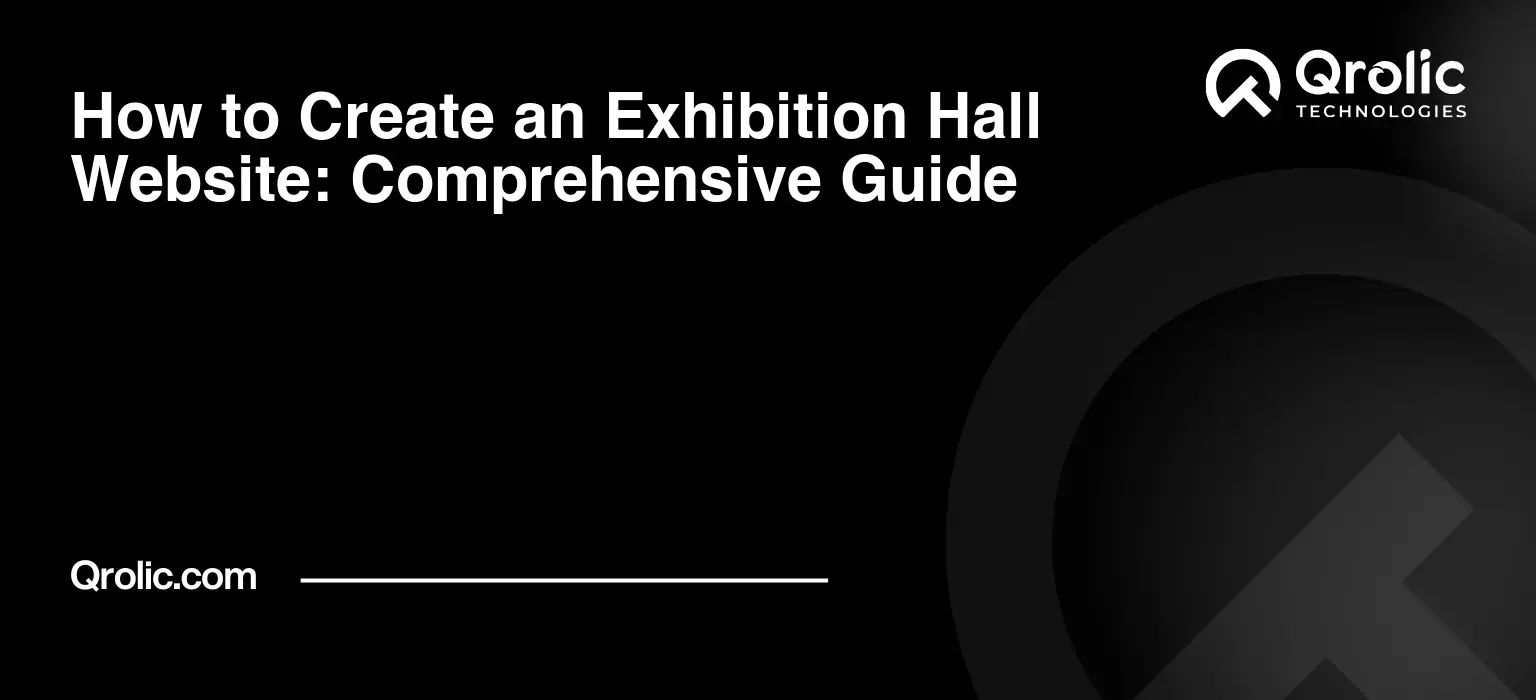Quick Summary:
- Plan your website strategy first.
- Showcase your venue with stunning visuals.
- Optimize your site for search and mobile.
- Promote your website to attract bookings.
Table of Contents
- Why Your Event Venue Needs a Killer Website: Beyond Just Being Online
- Laying the Foundation: Planning Your Event Venue Website Strategy
- 1. Defining Your Target Audience: Who Are You Trying to Reach?
- 2. Identifying Your Unique Selling Proposition (USP): What Makes You Different?
- 3. Defining Your Website’s Goals: What Do You Want to Achieve?
- 4. Competitive Analysis: Know Your Competition
- Choosing the Right Platform: Website Builders vs. CMS
- 1. Website Builders: User-Friendly and Affordable
- 2. Content Management Systems (CMS): Powerful and Customizable
- Essential Website Pages: The Blueprint for Success
- 1. Homepage: Your Digital First Impression
- 2. About Us: Tell Your Story and Build Trust
- 3. Venue Spaces: Showcase Your Event Areas
- 4. Services & Packages: Highlight What You Offer
- 5. Gallery: Show, Don’t Just Tell
- 6. Testimonials: Build Credibility with Social Proof
- 7. Blog: Share Valuable Content and Boost SEO
- 8. Contact Us: Make it Easy to Get in Touch
- 9. FAQ: Answer Common Questions and Save Time
- 10. Privacy Policy & Terms of Service: Protect Your Business and Your Clients
- Venue Design Matters: Captivating Visuals for Event Venue Websites
- 1. High-Quality Photography: Showcase Your Venue’s Beauty
- 2. Professional Video Production: Bring Your Venue to Life
- 3. Clean and Modern Design: Create a Positive User Experience
- 4. Branding Consistency: Maintain a Unified Visual Identity
- SEO Optimization: Making Your Venue Website Discoverable
- 1. Keyword Research: Identify Relevant Keywords
- 2. On-Page Optimization: Optimize Your Website’s Content
- 3. Off-Page Optimization: Build High-Quality Backlinks
- 4. Mobile Optimization: Ensure a Seamless Mobile Experience
- 5. Local SEO: Target Local Customers
- Call-to-Actions (CTAs): Guiding Visitors Towards Conversion
- 1. Prominent Placement: Make CTAs Visible
- 2. Clear and Concise Language: Tell Visitors What to Do
- 3. Value Proposition: Highlight the Benefits
- 4. A/B Testing: Optimize Your CTAs
- Analytics and Tracking: Measuring Your Website’s Success
- 1. Google Analytics: Track Website Traffic and User Behavior
- 2. Conversion Tracking: Measure Your Website’s ROI
- 3. Regular Reporting: Analyze Your Website’s Performance
- Don’t Forget Mobile Users: Optimizing for the Small Screen
- Event Venue Website Maintenance: Keeping Your Site Fresh and Up-to-Date
- Promoting Your Event Venue Website: Driving Traffic and Generating Leads
- 1. Social Media Marketing: Engage Your Target Audience
- 2. Email Marketing: Nurture Leads and Drive Bookings
- 3. Paid Advertising: Reach a Wider Audience
- 4. Content Marketing: Attract and Engage Potential Clients
- 5. Public Relations: Generate Media Coverage
- Qrolic Technologies: Your Partner in Digital Success
- Key Takeaways: Building an Event Venue Website That Works
Why Your Event Venue Needs a Killer Website: Beyond Just Being Online
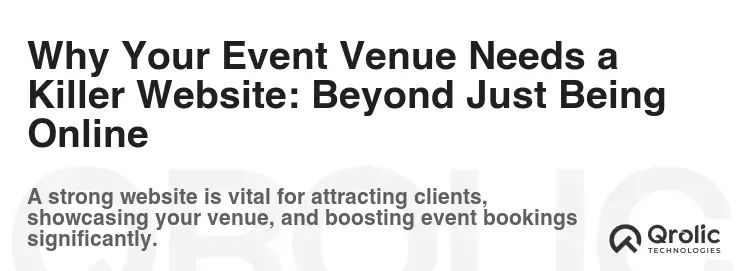
Let’s face it: in today’s world, your website is your digital storefront. But for event venues, it’s more than just a storefront; it’s a 24/7 open house, a virtual tour, and a powerful lead-generating machine. You’re not just selling space; you’re selling experiences, memories, and the promise of a perfectly executed event. A lackluster website simply won’t cut it.
Think about it: someone planning a wedding, a corporate conference, or a milestone birthday will likely start their search online. If your venue doesn’t have a strong online presence, or if your website is outdated, confusing, or unappealing, you’re missing out on valuable opportunities. You’re essentially turning potential clients away before they even walk through your doors.
A well-designed, SEO-optimized event venue website is essential for:
- Attracting More Bookings: A beautiful and informative website can dramatically increase inquiries and bookings.
- Building Trust and Credibility: A professional website showcases your expertise and instills confidence in potential clients.
- Showcasing Your Venue’s Unique Appeal: High-quality photos, virtual tours, and compelling descriptions can highlight what makes your venue special.
- Streamlining the Booking Process: Online booking forms, availability calendars, and FAQ sections can simplify the booking process for both you and your clients.
- Saving Time and Resources: By providing comprehensive information online, you can reduce the number of phone calls and emails you receive.
- Improving Your Search Engine Ranking: A well-optimized website will rank higher in search results, making it easier for potential clients to find you.
Laying the Foundation: Planning Your Event Venue Website Strategy
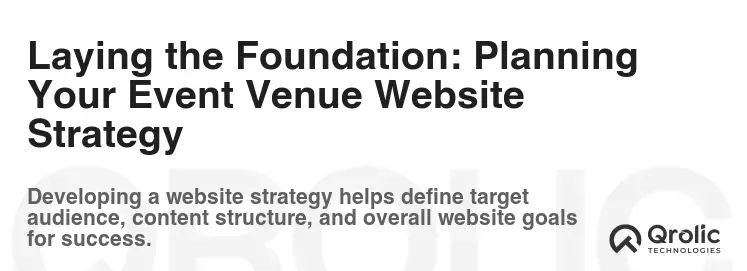
Before diving into the technical aspects of building your website, it’s crucial to develop a solid strategy. This involves defining your target audience, identifying your unique selling proposition (USP), and outlining your website’s goals.
1. Defining Your Target Audience: Who Are You Trying to Reach?
Knowing your ideal client is the first step. Are you targeting:
- Wedding couples?
- Corporate event planners?
- Social event organizers (birthday parties, anniversaries)?
- Specific industries (tech, finance, non-profit)?
Understanding their needs, pain points, and online behavior will inform your website’s design, content, and marketing strategy. For example, if you’re targeting wedding couples, your website should feature romantic imagery, testimonials from happy couples, and detailed information about wedding packages. If you’re targeting corporate event planners, you should highlight your venue’s capacity, technical capabilities, and experience hosting successful corporate events.
2. Identifying Your Unique Selling Proposition (USP): What Makes You Different?
What sets your venue apart from the competition? Is it:
- Your stunning location?
- Your exceptional service?
- Your unique architectural features?
- Your specialized event packages?
- Your commitment to sustainability?
Your USP should be prominently featured on your website and incorporated into your marketing messages. It’s what will attract potential clients and convince them to choose your venue over others.
3. Defining Your Website’s Goals: What Do You Want to Achieve?
What are the primary objectives of your website? Common goals include:
- Generating leads: Capturing contact information from potential clients.
- Increasing bookings: Driving direct bookings through your website.
- Showcasing your venue: Highlighting your venue’s features and capabilities.
- Building brand awareness: Establishing your venue as a leader in the event industry.
- Providing information: Answering frequently asked questions and providing helpful resources.
Clearly defining your goals will help you prioritize your website’s content and design and measure its success.
4. Competitive Analysis: Know Your Competition
Researching your competitors is essential. Analyze their websites to identify what works well and what doesn’t. Look at their design, content, SEO strategies, and user experience. This will help you identify opportunities to differentiate your venue and create a website that stands out from the crowd.
Choosing the Right Platform: Website Builders vs. CMS
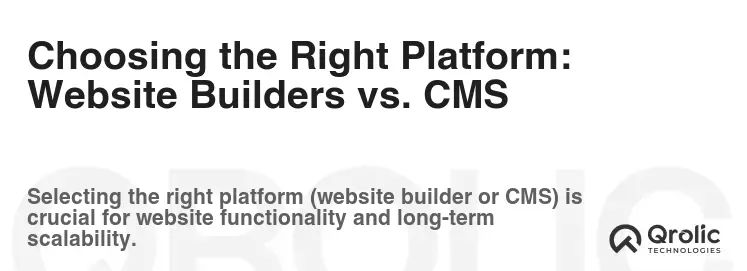
You have two main options for building your event venue website: website builders and content management systems (CMS). Each has its own pros and cons.
1. Website Builders: User-Friendly and Affordable
Website builders like Wix, Squarespace, and Weebly offer drag-and-drop interfaces, pre-designed templates, and all-in-one hosting solutions. They are ideal for beginners with limited technical skills and smaller budgets.
Pros:
- Easy to use: No coding knowledge required.
- Affordable: Monthly subscription plans are typically cheaper than hiring a web developer.
- Fast setup: You can launch a basic website in a matter of hours.
- All-in-one solution: Hosting, security, and updates are handled by the platform.
Cons:
- Limited customization: Design options may be restricted.
- Less control: You don’t have full control over your website’s code.
- Scalability issues: May not be suitable for complex websites with advanced features.
- Vendor lock-in: Migrating your website to another platform can be difficult.
2. Content Management Systems (CMS): Powerful and Customizable
CMS platforms like wordpress, Joomla, and Drupal offer more flexibility and control than website builders. They are ideal for businesses with more complex needs and larger budgets.
Pros:
- Highly customizable: You can create a unique website design with plugins and themes.
- Scalable: Suitable for websites of all sizes.
- SEO-friendly: Offers advanced SEO tools and plugins.
- Open-source: You have full control over your website’s code.
- Large community support: Extensive documentation and support forums are available.
Cons:
- Requires technical skills: Some coding knowledge may be required.
- More expensive: You’ll need to pay for hosting, a domain name, and potentially a web developer.
- More complex setup: Setting up and maintaining a CMS website can be more time-consuming.
- Security risks: Requires regular security updates to protect against vulnerabilities.
Recommendation: For most event venues, WordPress is the recommended platform. It offers a good balance of flexibility, scalability, and ease of use. There are also numerous WordPress themes and plugins specifically designed for event venues.
Essential Website Pages: The Blueprint for Success
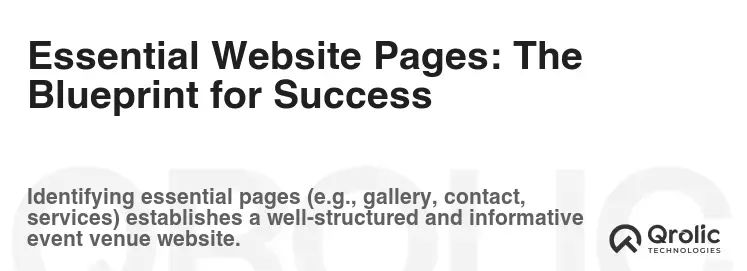
Your website’s structure is crucial for user experience and SEO. Here are the essential pages every event venue website should have:
1. Homepage: Your Digital First Impression
The homepage is the most important page on your website. It should:
- Clearly communicate your venue’s USP.
- Feature high-quality photos and videos.
- Include a compelling headline and call to action.
- Provide easy navigation to other important pages.
- Be visually appealing and mobile-friendly.
Consider using a hero image or video that showcases your venue’s best features. Include testimonials from satisfied clients and highlight any awards or recognition you’ve received.
2. About Us: Tell Your Story and Build Trust
The About Us page is your opportunity to connect with potential clients on a personal level. Share your venue’s history, mission, and values. Introduce your team and highlight their expertise. Use photos and videos to create a more engaging experience.
3. Venue Spaces: Showcase Your Event Areas
This page should provide detailed information about each of your venue spaces, including:
- High-quality photos and videos.
- Capacity and dimensions.
- Floor plans and layouts.
- Technical specifications (lighting, sound, AV equipment).
- Pricing information.
Consider offering virtual tours or 360-degree views of your venue spaces. This will allow potential clients to get a better sense of the space and envision their event taking place there.
4. Services & Packages: Highlight What You Offer
Clearly outline the services and packages you offer, such as:
- Wedding packages.
- Corporate event packages.
- Catering options.
- AV equipment rental.
- Event planning services.
Provide detailed descriptions of each package and include pricing information. Consider offering customizable packages to meet the specific needs of your clients.
5. Gallery: Show, Don’t Just Tell
A picture is worth a thousand words. Showcase photos and videos from past events to give potential clients a glimpse of what your venue can offer. Organize your gallery by event type (weddings, corporate events, social events) to make it easier for visitors to find what they’re looking for.
6. Testimonials: Build Credibility with Social Proof
Include testimonials from satisfied clients to build trust and credibility. Ask your clients to provide specific details about their experience, such as the quality of the service, the attentiveness of the staff, and the overall atmosphere of the venue.
7. Blog: Share Valuable Content and Boost SEO
A blog is a great way to share valuable content with your target audience and improve your website’s SEO. Write about topics related to event planning, venue design, and local events.
- Event planning tips.
- Venue design trends.
- Local attractions and activities.
- Behind-the-scenes stories from your venue.
8. Contact Us: Make it Easy to Get in Touch
Make it easy for potential clients to get in touch with you. Include a contact form, phone number, email address, and physical address. Consider adding a live chat feature to provide instant support.
9. FAQ: Answer Common Questions and Save Time
Create a frequently asked questions (FAQ) page to answer common questions about your venue, services, and booking process. This will save you time and reduce the number of phone calls and emails you receive.
10. Privacy Policy & Terms of Service: Protect Your Business and Your Clients
These pages are essential for legal compliance and protecting your business and your clients. Consult with an attorney to ensure that your privacy policy and terms of service are comprehensive and up-to-date.
Venue Design Matters: Captivating Visuals for Event Venue Websites
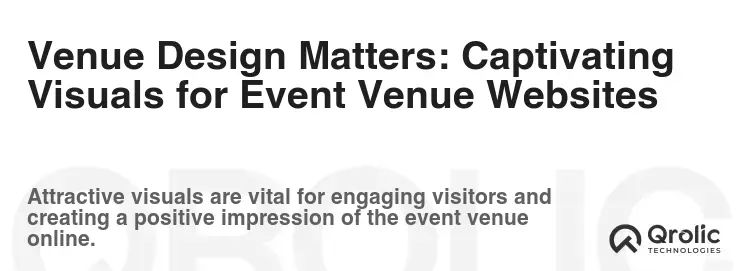
The visual appeal of your website is crucial for attracting and engaging potential clients. Invest in high-quality photography, professional video production, and a clean, modern design.
1. High-Quality Photography: Showcase Your Venue’s Beauty
Invest in professional photography to capture your venue’s best features. Use a variety of shots, including wide-angle shots, close-up shots, and detail shots. Make sure the photos are well-lit, properly exposed, and visually appealing.
- Showcase different event setups: Capture photos of your venue set up for weddings, corporate events, and social events.
- Highlight architectural details: Focus on the unique architectural features of your venue.
- Capture the ambiance: Use lighting and composition to convey the atmosphere of your venue.
2. Professional Video Production: Bring Your Venue to Life
Video is a powerful tool for showcasing your venue and engaging potential clients. Create a video tour of your venue, or produce a promotional video that highlights your venue’s unique features and services.
- Use drone footage: Capture stunning aerial views of your venue and its surroundings.
- Include testimonials: Feature testimonials from satisfied clients in your video.
- Showcase event highlights: Capture highlights from past events to give potential clients a glimpse of what your venue can offer.
3. Clean and Modern Design: Create a Positive User Experience
Your website’s design should be clean, modern, and easy to navigate. Use a consistent color scheme, typography, and imagery. Make sure your website is mobile-friendly and loads quickly.
- Use white space: Don’t clutter your website with too much text or images.
- Choose a responsive design: Make sure your website looks good on all devices.
- Optimize for speed: Optimize your images and code to ensure that your website loads quickly.
4. Branding Consistency: Maintain a Unified Visual Identity
Maintain consistency with your branding across your website, social media, and other marketing materials. Use the same logo, colors, and fonts to create a unified visual identity.
SEO Optimization: Making Your Venue Website Discoverable
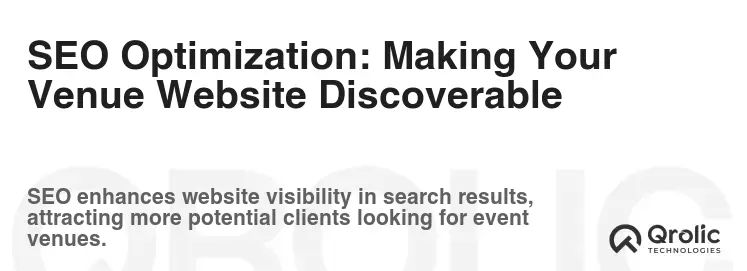
Search engine optimization (SEO) is the process of optimizing your website to rank higher in search engine results. This is essential for attracting organic traffic to your website.
1. Keyword Research: Identify Relevant Keywords
Conduct keyword research to identify the keywords that potential clients are using to search for event venues in your area. Use tools like Google Keyword Planner, Ahrefs, and SEMrush to find relevant keywords with high search volume and low competition.
- Location-based keywords: “Event venue in [city]”
- Event type keywords: “Wedding venue,” “corporate event space,” “party venue”
- Feature-based keywords: “Waterfront venue,” “garden venue,” “ballroom venue”
2. On-Page Optimization: Optimize Your Website’s Content
Optimize your website’s content with relevant keywords. Use keywords in your page titles, headings, meta descriptions, and body text. Make sure your content is well-written, informative, and engaging.
- Title tags: Write compelling title tags that accurately describe the content of each page.
- Meta descriptions: Write concise meta descriptions that entice users to click on your website in search results.
- Header tags: Use header tags (H1, H2, H3) to structure your content and highlight important keywords.
- Image alt text: Add alt text to your images to describe what the image is about.
3. Off-Page Optimization: Build High-Quality Backlinks
Build high-quality backlinks from other websites to improve your website’s authority and ranking. Guest blogging, directory listings, and social media promotion are effective ways to build backlinks.
- Guest blogging: Write guest posts for other websites in your industry and include a link back to your website.
- Directory listings: List your venue in online directories like Yelp, Google My Business, and The Knot.
- Social media promotion: Share your website’s content on social media to drive traffic and build backlinks.
4. Mobile Optimization: Ensure a Seamless Mobile Experience
Ensure that your website is mobile-friendly. More and more people are using their mobile devices to search for event venues. If your website is not mobile-friendly, you’re missing out on potential clients.
5. Local SEO: Target Local Customers
Optimize your website for local search. Claim your Google My Business listing and include your venue’s address, phone number, and website URL. Encourage your clients to leave reviews on Google.
Call-to-Actions (CTAs): Guiding Visitors Towards Conversion
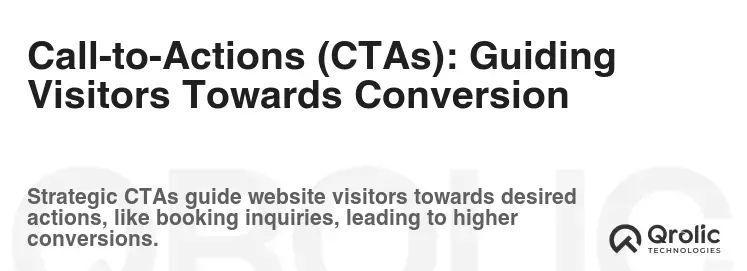
A call to action (CTA) is a prompt that encourages visitors to take a specific action on your website. Effective CTAs are crucial for driving leads and bookings.
1. Prominent Placement: Make CTAs Visible
Place CTAs prominently on your website, such as in the header, footer, and within the body of your content. Use contrasting colors and clear, concise language.
2. Clear and Concise Language: Tell Visitors What to Do
Use clear and concise language that tells visitors exactly what you want them to do.
- “Book Now”
- “Request a Quote”
- “Contact Us”
- “Download Our Brochure”
- “Schedule a Tour”
3. Value Proposition: Highlight the Benefits
Highlight the benefits of taking action. Tell visitors what they will gain by clicking on your CTA.
- “Book Now and Save 10%”
- “Request a Quote for a Free Consultation”
- “Contact Us to Learn More”
- “Download Our Brochure for Inspiration”
- “Schedule a Tour to See Our Venue in Person”
4. A/B Testing: Optimize Your CTAs
Test different CTAs to see which ones perform best. Experiment with different wording, colors, and placement. Use A/B testing tools to track your results and optimize your CTAs for maximum conversion.
Analytics and Tracking: Measuring Your Website’s Success
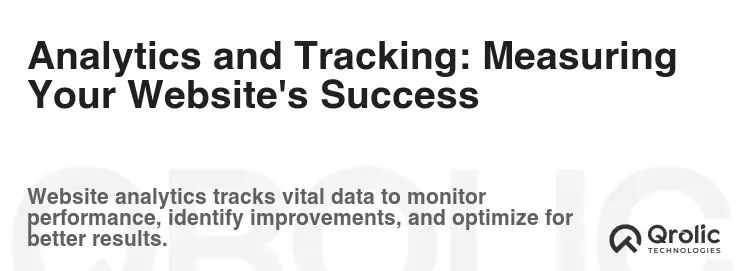
Tracking your website’s performance is essential for understanding what’s working and what’s not. Use analytics tools like Google Analytics to track your website’s traffic, bounce rate, and conversion rate.
1. Google Analytics: Track Website Traffic and User Behavior
Google Analytics is a free tool that provides detailed information about your website’s traffic, user behavior, and conversion rate. Use Google Analytics to track:
- Website traffic: How many people are visiting your website?
- Traffic sources: Where are your visitors coming from?
- Bounce rate: How many people are leaving your website after viewing only one page?
- Conversion rate: How many people are taking the desired action on your website (e.g., booking an event, requesting a quote)?
2. Conversion Tracking: Measure Your Website’s ROI
Set up conversion tracking in Google Analytics to measure the ROI of your website. Track the number of leads and bookings generated by your website.
3. Regular Reporting: Analyze Your Website’s Performance
Regularly review your website’s analytics to identify areas for improvement. Analyze your website’s traffic, bounce rate, and conversion rate. Use this information to optimize your website’s content, design, and SEO strategy.
Don’t Forget Mobile Users: Optimizing for the Small Screen
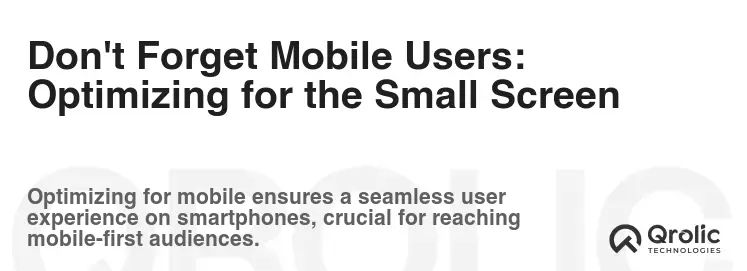
In today’s mobile-first world, optimizing your website for mobile devices is non-negotiable. A responsive website design adapts seamlessly to different screen sizes, providing a consistent user experience across all devices.
- Mobile-friendly design: Ensure your website is responsive and looks good on all devices.
- Fast loading speed: Optimize your images and code to ensure your website loads quickly on mobile devices.
- Easy navigation: Make it easy for mobile users to navigate your website.
- Touch-friendly elements: Use touch-friendly buttons and links.
- Mobile-specific CTAs: Use mobile-specific CTAs, such as “Tap to Call” and “Get Directions.”
Event Venue Website Maintenance: Keeping Your Site Fresh and Up-to-Date
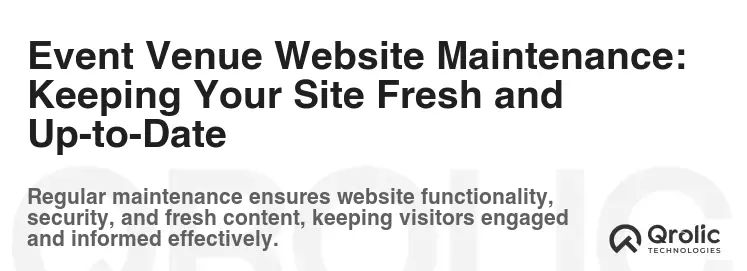
Your website is not a “set it and forget it” project. It requires ongoing maintenance to ensure that it remains up-to-date, secure, and effective.
- Regular content updates: Keep your website’s content fresh and up-to-date.
- Security updates: Install security updates regularly to protect against vulnerabilities.
- Plugin updates: Keep your website’s plugins up-to-date.
- Backup your website: Regularly back up your website to protect against data loss.
- Monitor website performance: Regularly monitor your website’s performance to identify and fix any issues.
Promoting Your Event Venue Website: Driving Traffic and Generating Leads
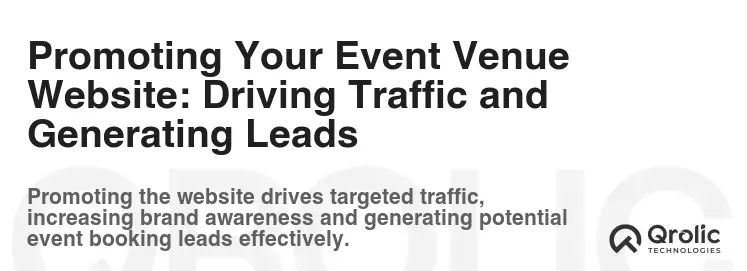
Building a great website is only half the battle. You also need to promote your website to drive traffic and generate leads.
1. Social Media Marketing: Engage Your Target Audience
Use social media to engage your target audience and promote your venue. Share photos and videos of your venue, promote upcoming events, and run contests and giveaways.
2. Email Marketing: Nurture Leads and Drive Bookings
Build an email list and use email marketing to nurture leads and drive bookings. Send out newsletters, promotional emails, and event invitations.
3. Paid Advertising: Reach a Wider Audience
Use paid advertising platforms like Google Ads and social media ads to reach a wider audience. Target your ads to potential clients who are interested in event venues in your area.
4. Content Marketing: Attract and Engage Potential Clients
Create valuable content that attracts and engages potential clients. Write blog posts, create infographics, and produce videos that address the needs and interests of your target audience.
5. Public Relations: Generate Media Coverage
Reach out to local media outlets to generate media coverage for your venue. Promote upcoming events, announce new services, and share success stories.
Qrolic Technologies: Your Partner in Digital Success
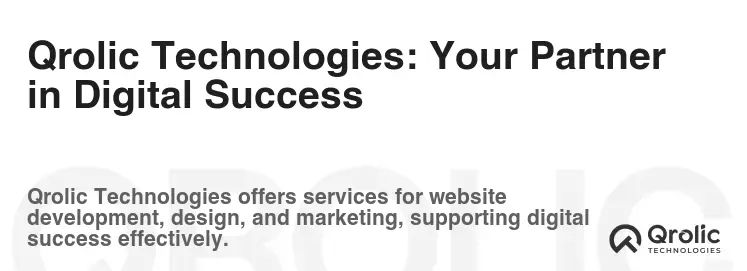
Qrolic Technologies (https://qrolic.com/) is a leading digital marketing agency that specializes in helping businesses like event venues thrive online. From website design and development to SEO, social media marketing, and content creation, Qrolic Technologies offers a comprehensive suite of services to help you achieve your digital marketing goals.
How Qrolic Technologies Can Help Your Event Venue:
- Custom Website Design & Development: Qrolic Technologies can create a stunning, user-friendly website that showcases your venue’s unique appeal and drives bookings.
- SEO Optimization: Their SEO experts can optimize your website to rank higher in search results, making it easier for potential clients to find you online.
- Social Media Marketing: Qrolic Technologies can help you create engaging social media content that attracts and engages your target audience.
- Content Creation: Their team of experienced writers can create valuable content that educates, informs, and inspires potential clients.
- Paid Advertising: Qrolic Technologies can manage your paid advertising campaigns to reach a wider audience and generate leads.
Partner with Qrolic Technologies to take your event venue’s online presence to the next level and attract more bookings.
Key Takeaways: Building an Event Venue Website That Works
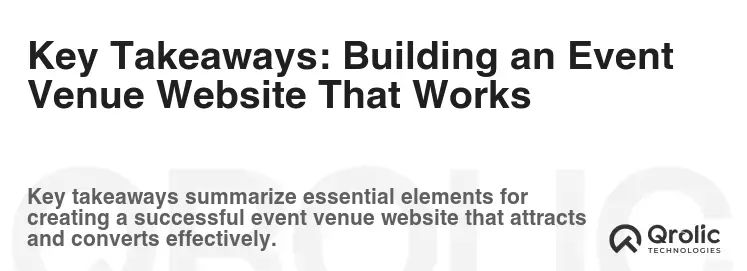
Creating an effective event venue website requires a strategic approach, a focus on user experience, and a commitment to ongoing maintenance and promotion. Here’s a recap of the key steps:
- Plan Your Strategy: Define your target audience, identify your USP, and outline your website’s goals.
- Choose the Right Platform: wordpress is generally recommended for its flexibility and scalability.
- Create Essential Pages: Include a compelling homepage, an informative About Us page, detailed Venue Spaces pages, and a comprehensive Contact Us page.
- Focus on Visuals: Invest in high-quality photography and professional video production.
- Optimize for SEO: Conduct keyword research and optimize your website’s content and structure.
- Use Effective CTAs: Guide visitors towards conversion with clear and concise calls to action.
- Track Your Results: Use analytics tools to measure your website’s performance and identify areas for improvement.
- Optimize for Mobile: Ensure your website is mobile-friendly and provides a seamless user experience on all devices.
- Maintain Your Website: Keep your website’s content fresh, secure, and up-to-date.
- Promote Your Website: Use social media, email marketing, paid advertising, and content marketing to drive traffic and generate leads.
By following these guidelines, you can create an event venue website that attracts more bookings, builds trust and credibility, and helps you achieve your business goals. Remember, your website is your digital storefront, so make it count!
